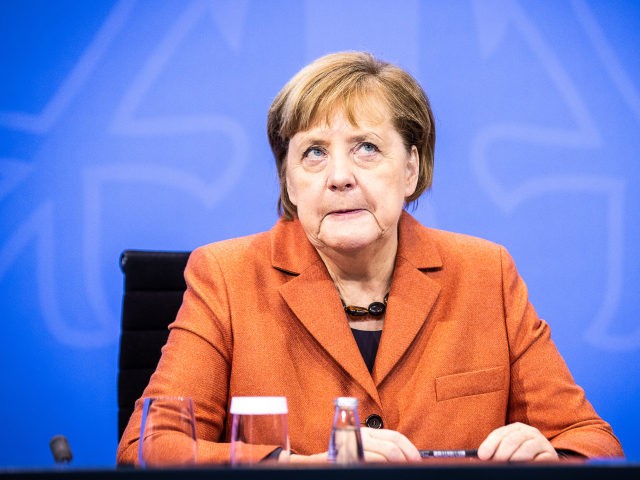In a move that may be deemed uncharacteristic for the Europhile, Angela Merkel’s government unilaterally bought 76 million extra doses of coronavirus vaccines for the German people, rather than waiting for Brussels to secure vaccines for all member-states.
Earlier, the EU-27 agreed on a collective vaccine-purchasing scheme whereby Brussels would negotiate with drugs vendors on their behalf and distribute by population the 2.3 billion doses.
Fellow member-states have criticised Germany for ordering an additional 30 million Pfizer/BioNTech doses for itself, as well as 20 million CureVac shots. Germany purchased another 26 million — 21 million by Moderna and the rest Pfizer — after other EU nations had rejected them either because of their cost, difficulty in delivering the product, or the vaccines’ experimental nature.
Belgium’s MEP Frédérique Ries, who sits on the European Parliament’s health committee, said that while she did not object to her neighbour buying the vaccines rejected by other states, she said the purchase of 30 million Pfizer vaccines showed “a total lack of solidarity”, according to The Times on Tuesday.
Polish MEP Witold Waszczykowski, Poland’s former foreign secretary and member of the country’s governing Law and Justice (PiS) party, was more blunt in his criticism.
“It is selfish behaviour to buy medicine by yourself, disrespecting common decisions,” Mr Waszczykowski said. “It is another example of the German policy of respecting their own interests above the interests of other EU countries.”
Germany — one of the most powerful and pro-EU members of the bloc — maintains that despite unilaterally negotiating with the drugs companies, it has not broken the rules, saying the doses will not be issued until the EU-organised vaccines have been distributed across the bloc.
‘Setback for the Free World’: EU Trade Deal with Communist China Draws Harsh Criticism https://t.co/CktU0dsAnG
— Breitbart London (@BreitbartLondon) January 5, 2021
Other cracks appear in the EU’s vaccination programme, with President Andrzej Duda’s chief of staff, Krzysztof Szczerski, saying in response to the Germany issue Poland may “consider individual discussions with suppliers if the European vaccine purchasing system completely fails”.
Cyprus is also in talks with Israel’s Benjamin Netanyahu over supplying vaccines to the island nation, as the European Union’s procurement process was “not enough for rapid and mass vaccinations”.
There are other concerns in Europe over Brussels’ handling of the vaccine distribution, with senior Czech conservative MEP Jan Zahradil demanding transparency on distribution across the bloc and price, following “rumours and contradictory speculation”.
In an effort to rein in its members, The Guardian reports that the head of the EU’s powerful executive arm, European Commission President Ursula von der Leyen — who is German — is contacting the EU-27’s health ministers to ensure that they will continue to follow the bloc’s orders.
Last week, von der Leyen had said that the memorandum on vaccine distribution was “legally binding”, adding: “We have all agreed… that there will be no parallel negotiations, no parallel contracts… We’re all working together.”
That “solidarity” in the EU is fracturing over the micromanagement of member-states’ vaccination regimes may be unsurprising. Leading Brexiteer Nigel Farage predicted that there might not be an EU in a decade, because the bloc is already split culturally east and west, and financially north and south.
Speaking a week after the UK left the EU’s institutions, Mr Farage said of the division: “Just look at what’s happening in Brussels: you’ve got the Poles and the Hungarians, vetoing the budget. You’ve got a eurozone, which is driving the south into deeper and deeper poverty.”
“I don’t think they’ll even be a European Union in ten years’ time. I think that we have set the standard,” Mr Farage continued, predicting a mainstreaming of eurosceptic thought on the continent in the next two to three years.
From ‘Dangerous Fantasy’ to Reality in Seven Years: EU Reveals ‘Uniformed Service’ https://t.co/PrvBM6a8So
— Breitbart London (@BreitbartLondon) January 12, 2021

COMMENTS
Please let us know if you're having issues with commenting.